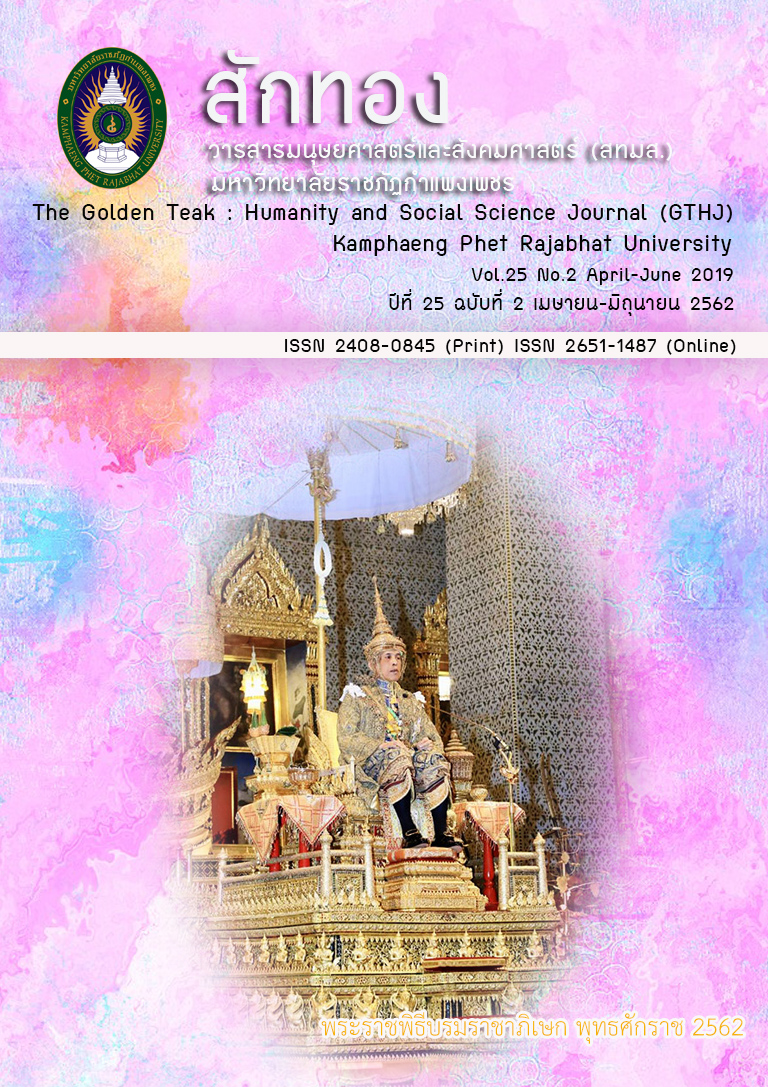A Study of the Relationship Between Emotional Quotient and Conflict Management of School Administrators in Phetchabun Primary Educational Service Area Office 1
Main Article Content
Abstract
The purposes of this research were to study the level of emotional quotient and conflict management of school administrators and to study the correlation between emotional quotient and conflict management of school administrators in Phetchabun Primary Educational Service Area Office 1. The sample consisted of 108 school administrators in Phetchabun Primary Educational Service Area Office 1 by determine the sample size from Krejcie and Morgan’s table and stratified random sampling technique. The research instruments were the questionnaire concerned the emotional quotient and conflict management of school administrators. The statistical analysis that was applied including: percentage, mean ( ), standard deviation (S.D.) and Pearson’s coefficient correlation. The results were as follow: 1) The overall level of emotional quotient of school administrators in Phetchabun Primary Educational Service Area Office 1 was high level. When considering each side of emotional quotient, it was found that self-awareness, self-regulation, self-motivation, empathy and social skill were high level. 2) The overall of conflict management of school administrators in Phetchabun Primary Educational Service Area Office 1 was high level. When considering each side of conflict management, it was found that compromising, collaboration and accommodation were high level, but avoiding and competition were moderate level. 3) The emotional quotient had positive relationship with conflict management of school administrators in Phetchabun Primary Educational Service Area Office 1 at the significant level of .01.
Article Details
บทความที่ได้รับการตีพิมพ์เป็นลิขสิทธิ์ของวารสาร สักทอง : วารสารมนุษยศาสตร์และสังคมศาสตร์ สถาบันวิจัยและพัฒนา มหาวิทยาลับราชภัฏกำแพงเพชร
ข้อคิดเห็นใดๆ ที่ปรากฎในวารสารเป็นวรรณกรรมของผู้เขียนโดยเฉพาะ ซึ่งมหาวิทยาลัยราชภัฏกำแพงเพชรและบรรณาธิการไม่จำเป็นต้องเห็นด้วย
References
Konkham, C. (2001). Emotional Maturity and conflict management of school
administrators in Lopburi Primary Educational Service Area Office. Master’s thesis
of Educational Administration, Thepsatri Rajabhat University.
Masakul, T. (2004). Relationship between Emotional Maturity of School Administrators
and Conflict Resolution of Subordinates’ Performance. Master’s thesis of
Educational Administration, Valaya Alongkorn Rajabhat University Under The
Royal Patronage.
Nilnoi, N. (2006). Relationship between Five Personalities, Emotional Quotient and
Behavior for Conflict Management of Village Leaders in Han Ka District of
Chainat. Master’s thesis of Science, Industrial Psychology program, Kasetsart
University.
Panicharoen, S. (2002). Personalities, Emotional Quotient and Conflict Management of
Head of Learning Department of Secondary School in Bangkok Educational
Service Area Office 3. Master of Arts. Industrial and Organizational Psychology
program, King Mongkut's University of Technology North Bangkok.
Panichplinchai, T. (2014). Social Science Research Methodology. Phitsanulok : Faculty
of Education Naresuan University.
Pannitamai, W. (2008). Emotional Quotient (E.Q.): Index for Happiness and Success
of Life. (7 th ed.). Bangkok : Chulalongkorn University Printing House.
Pisaisawad, R. (2012). The Relationship Between Emotional Intelligence and Conflict
Management of School Administrators in Nongkhai Primary Educational
Service Area Office. Master’s thesis of Educational Administration, Udon Thani
Rajabhat University.
Promsri, C. (2005). Leadership Intelligence. The journal of Christian University, 11(2), 93-99.
Sachukorn, S. (2007). Excellence service. (5 th ed.). Bangkok : Saitarn Publishing.
Sangdeuan, S. (2003). Management Cook Book (Revised edition). Bangkok : Eastern
Printing Public Company Limited.
Srisa-ard, B. (1989). Statistical Methods for Research Volume 1. Bangkok : Foundation of
Education program, Faculty of Education, Srinakharinwirot University, Mahasarakham
campus.
_______. (2002). Basic Research. (7 th ed.). Bangkok : Suveriyasan.
Wongratana, C. (1980). Techniques of Using Statistics for Research. Bangkok : Foundation
of Education program, Faculty of Education, Srinakharinwirot University.


